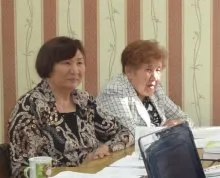
“No, I wasn’t a language scholar. I graduated from medical college and continued my studies at the biological department of the university. For a long time, my education was in conflict with my newly acquired Christian faith. The story of Jonah and the whale, for example, was a huge stumbling block for me. As a biolo

Nina continued: “You asked if I was invited to join the Kalmyk translation project because I was already a Christian in the early 1990s, when the vast majority of Kalmyks were either Soviet-era atheists or Buddhists, which is our traditional religion. Honestly, I don’t think my Christianity was mature enough at that moment to make me fit for Bible translation work. I was still new to the faith and didn’t yet understand very much.”
“Were you then known for your proficiency in your mother tongue?” I insisted.
“That I was,” she perked up, “but when I was asked to join the project, my first reaction was nevertheless ‘Why me? There are quite a few other people who speak good Kalmyk, but unlike me, they are professionals in the sphere of our mother tongue, and are teaching Kalmyk in schools or at the university.’ The person who invited me sighed and responded: ‘Yes, they are. But they are all afraid.’ I, on the other hand, was not afraid. Even now, when the project has been successfully developing for so many years, other team members sometimes complain that people tease them because of their Bible translation work. People say mockingly: ‘Are you now a Christian? Have you converted to the Russian God?’ But nobody teases me. Everybody is now used to the fact that I’m a Christian, because I never tried to hide this from the very beginning. People see my Christian faith and life style (no drinking or smoking, etc.) as part of my identity. So this may be the answer to why I was invited to join the project: I was not afraid.”

“But let me return to why I decided to join the project. The project’s exegetical advisor at that time said that Bible translation was going to revive the Kalmyk language, and these words brought joy to my heart, so I immediately wanted to participate. Did you know that our Kalmyk language was and still is endangered? The entire Kalmyk population was deported to Siberia during Stalin’s regime, so that is where I was born and spent my early childhood. Paradoxically, we spoke Kalmyk while in Siberia, but we gradually stopped speaking our language after we were allowed to return to Kalmykia in the 1950s. Probably this was because our people had an acute desire to preserve our ethnic identity while we were dispersed among other peoples in exile, but after returning to their own land, Kalmyk communists wanted to confirm their loyalty to Russia, so Russian became the main language in Kalmykia. I was 12 when my family returned from Siberia. We continued to speak Kalmyk at home, but by this time Russian had already become the established language of school education in Kalmykia, with only two classes of Kalmyk language instruction per week. When I started working as a Scripture translation field tester, it didn’t even cross my mind to bring these texts to young people. I was sure that no young people knew Kalmyk well enough to help me in field testing. The field testing of the

Nina says that it’s really interesting for her to now work on field-testing of Old Testament books (Deuteronomy being the latest). The Pentateuch is expected to be submitted to the IBT publishing department in the near future. Nina’s next task will be field testing of the Minor Prophets Habakkuk and Malachi. We hope that the Biblical message from the Old Testament books will find an eager audience among both young and old readers.
We would greatly appreciate your financial assistance towards IBT projects.
If you prefer to send your donation through a forwarding agent in the U.S. or Europe, please write to us(link sends e-mail) and we'll provide the details of how this can be done.
IBT Russia/CIS is a non-profit organization financed through contributions from individuals, sponsoring organizations and foundations.
You can donate to IBT:
Through: AO UniCredit Bank, Moscow
SWIFT: IMBKRUMM
In favour of: Institute for Bible Translation
Address: 119334, Russia, Moscow, Andreevskaya nab. 2
TIN (INN) 7736231521
9-digit Bank identification code in Russian banking system: 044525545
Account no. (IBAN):
634261 USD 4020 02 001 or 40703840700010142881
634261 EUR 4020 02 001 or 40703978700010366720
634261 GBP 4020 02 001 or 40703826600010366723
Through: NOSTRO ACCOUNTS OF AO UNICREDIT BANK, MOSCOW:
USD JPMORGAN CHASE BANK N.A., NEW YORK SWIFT CODE: CHASUS33
EUR UNICREDIT BANK AG (HYPOVEREINSBANK) , MUNICH SWIFT CODE: HYVEDEMM
EUR UNICREDIT BANK AUSTRIA AG, VIENNA SWIFT CODE: BKAUATWW
EUR UNICREDIT S.P.A., MILANO SWIFT CODE: UNCRITMM
GBP THE ROYAL BANK OF SCOTLAND PLC, LONDON SWIFT CODE: RBOSGB2L
Important! In the field "designation" write "CHARITY DONATION"
For more information address IBT
You may sign up to receive our Russia/CIS monthly English newsletter here
